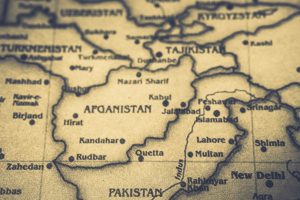In the morning hours of March 9 in Mazar-i-Sharif, a suicide bomber blew himself up inside the second-floor office of Mohammad Dawood Muzammil, the Taliban governor of Afghanistan’s Balkh province. The Islamic State Khorasan Province (ISKP) claimed responsibility for the killing of one of the highest-ranking figures in the Taliban administration.
Muzammil, in his capacity as the governor of Nangarhar, had led a fight against ISKP and was moved to Balkh in late 2022. Prior to this, ISKP had killed Abdul Haq Abu Omar, the Taliban’s police commander for Badakhshan province, and a Taliban judge in Jalalabad. These killings have taken the Taliban and ISKP conflict to a whole new phase, with the odds heavily stacked in favor of the latter.
Since the Taliban takeover in August 2021, ISKP has emerged as a powerful terrorist group in Afghanistan. A Sunni group, similar to the Taliban, ISKP’s recurrent attacks are a direct challenge to the Taliban’s authority. At least 16 attacks carried out by ISKP between August 2021 and September 2022 on the minority Shia Hazara community in places of worships, schools, and workplaces — killing over 700 people — and an attack on a Sikh place of worship, burned a hole in the Taliban’s assurance of providing safety to all ethnicities in the country. Attacks on the embassies of Russia (September 2022), Pakistan (December 2022), and a hotel housing Chinese diplomats and executives (also December 2022), mock the Taliban’s security set up, which aims to provide security to the handful of countries still running their embassies in Kabul.
The killing of Taliban troopers and officials, and attacks in the vicinity of Taliban offices, on the other hand, are a direct affront to the Islamic Emirate, sending a message that in the long run, ISKP could pose an existential threat to the Taliban.
Since August 2021, the Taliban’s response has ranged from denying ISKP’s presence on Afghan soil to painting the group as weak and inconsequential. The Taliban regime has refused any external assistance to deal with ISKP, reiterating that it remains fully capable of doing so on its own. Almost every ISKP attack is followed invariably by a Taliban raid on an ISKP hideout in Kabul and elsewhere that kills the alleged perpetrators behind the attacks. For instance the killing of Qari Fateh, the alleged intelligence chief of ISKP, in a raid by the Taliban in Kabul in February 2023 was highlighted as a success in responding to the attacks on the Russian, Pakistani, and Chinese diplomatic missions. In early January 2023, eight ISKP cadres were killed in Kabul and Nimroz province; a Taliban spokesperson claimed the deceased were responsible for the attacks on a Kabul hotel, the Pakistani embassy, and also the Kabul airport.
The Taliban’s public posturing of being in control, however, belies the group’s sense of unease with the steady ascension of ISKP. According to international assessments, ISKP’s strength has almost doubled from 3,000 to 6,000 in about 18 months following August 2021. In November 2021, the United Nations envoy to Afghanistan confirmed the group’s presence in all of Afghanistan’s 34 provinces. It is clear that the frequent raids by Taliban soldiers that result in the reported killing of ISKP members have not done much to quell the group’s potential. ISKP, at least on one occasion in early March, claimed that the publicized Taliban raids are fake, no more than the killing of the imprisoned members of the group already in the custody of the Taliban.
The Taliban failure to contain ISKP’s violence can broadly be described as the failure of a former insurgent group to transform itself into an effective counterinsurgent force. At another level, however, the lack of capacity could also be due to the linkages a prominent faction of the Taliban share with ISKP. The Haqqani Network has had links with ISKP in the past; in the opinion of former Afghan intelligence officials, those ties have continued. The Haqqanis, a significant power center within the Islamic Emirate, control several influential ministries including the Interior Ministry headed by Sirajuddin Haqqani. The nexus may have resulted in constraining the Islamic Emirate to indulge in showpiece raids and questionable claims regarding weakening the ISKP.
Worse still, the Haqqani Network’s power contestation with the Kandahar-based top Taliban leadership may be aiding ISKP in carrying out major strikes such as the killing of Balkh governor Muzammil. Muzammil belonged to the Noorzai tribe, similar to the present Taliban chief Hibatullah Akhundzada, and was a fierce loyalist. In late 2022, Akhundzada dismissed Balkh governor Qudratullah Abu Hamza, a member of the Haqqani Network, and appointed Muzammil in his place. Hamza, a Tajik, had led Taliban operations to capture Mazar-i-Sharif in 2021. According to the spokesperson of the National Resistance Front, Hamza’s sudden replacement may have triggered internal strife within the Taliban, pushing the Haqqanis to facilitate the ISKP attack on Muzammil. This may explain the fact that the suicide bomber was able to breach multiple security layers to reach the governor.
The truth, or the lack of it, in these narratives notwithstanding, the gradual consolidation and expansion of ISKP in the coming months appears to be a serious possibility. The Taliban are neither demonstrably capable of weakening ISKP, nor are they willing to accept any capacity enhancing external cooperation in this regard. This validates the concerns expressed by regional countries that under the Taliban Afghanistan could slide into becoming a safe haven and launchpad for terrorism.
ISKP’s end objective goes beyond the territory of Afghanistan. Unless a regional consensus-based approach is firmed up, the region could be staring at an unstable future marked by intense violence and instability.

































